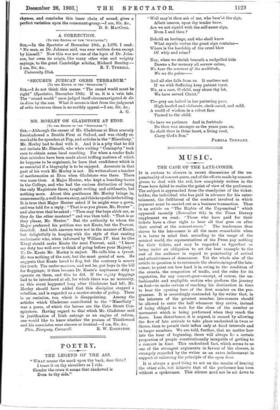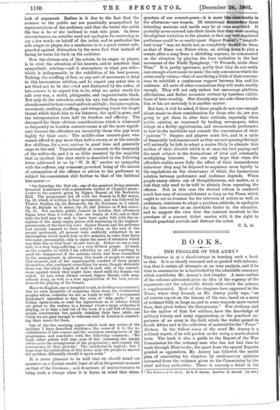M US IC.
THE CASE OF THE LATE-COMER.
IT is curious to observe in recent discussions of the un- punctuality of concert-goers, and of the efforts made by concert- givers to deal with the evil, how completely writers in the Press have failed to realise the point of view of the performer. The subject is approached from the standpoint of the ticket.. holder, the individual who has paid in advance for his enter- tainment, the fulfilment of the contract involved in which payment must be carried out as a business transaction. Thus in an article on " The Rights of the Unpunctual " which appeared recently (November 6th) in the Times literary supplement we read " Those who have paid for their tickets have a clear right to hear all that goes on after
their arrival at the concert-room." The tenderness thus shown to the late-comer is all the more remarkable when it is borne in mind that, according to the usage of the musical world, the representatives of the Press pay nothing for their• tickets, and may be regarded es hypothesi as being under an obligation to set the best example to the rest of the audience in regard to punctuality of arrival and attentiveness of demeanour. Yet the whole aim of the article in question is to extenuate the shortcomings of the late- comer, to point out how hard it is, owing to the condition of the streets, the congestion of traffic, and the rules for its regulation, for any concert-goer—except, of course, the un- fashionable and negligible section who perform the journey on foot—to make certain of reaching his destination in time to hear the opening bars of the first number on the pro- gramme. It is accordingly contended by the writer that, in the interests of the greatest number, late-comers should be allowed to enter the hall whenever they arrive, instead of being obliged to wait for the close of the number or movement which is being performed when they reach the doors. Less disturbance, it is argued, is caused by allowing the flow of late arrivals to take place unchecked in twos or threes, than to permit their influx only at fixed intervals and in larger numbers. We are told, further, that no matter how late the hour of beginning, there will always b.3 a certain proportion of people constitutionally incapable of getting to a concert in time. This undoubted fact, which seems to us one of the strongest arguments in favour of the closure, is strangely regarded by the writer as an extra inducement in support of enforcing the principle of the open door.
It is always a good thing to act on the maxim of hearing the other side, but hitherto that of the performer has been without a spokesman. This silence need not be set down to
lack of argument. Rather is it due to the fact that the avenues to the public ear are practically monopolised by representatives of the audience, and that the better the artist the less is he or she inclined to rush into print. In these circumstances, an outsider need not apologise for venturing to say a few words on behalf of the artist, and in particular the solo singer or player, for a conductor is to a great extent safe- guarded against distraction by the mere fact that instead of facing he turns his back on the audience.
Now the obvious aim of the soloist, be he singer or player, is to rivet the attention of his hearers, and to establish that sympathetic relation—call it atmosphere or what, you will— which is indispensable to the exhibition of his best powers. Talking, the scuffling of feet, or any sort of movement is fatal to this harmonious relation, and to expect any artist who is not blind not to be disturbed and distracted by the influx of late-comers is to expect him to be, what no artist worth his salt ever was, a stolid, phlegmatic, and imperturbable block. Not only do the intruders catch his eye, but they cause those already seated to turn round and look and talk ; the interruption, movement, rustling, shuffling, and whispering break the magic thread which binds him to his listeners, the spell is gone, and the interpretation loses half its freedom and efficacy. The disregard for these obvious considerations which is witnessed so frequently in London concert-rooms is all the more signifi- cant because the offenders are invariably those who pay most highly for their seats. The middle-class concert-goer, who cannot afford to pay more than half-a-crown, or at the outside five shillings, for a seat, arrives in good time and generally stays to the end.-- Unpunctuality at concerts is the monopoly of the well-to-do, and it is so little resented by the majority that an incident like that which is described in the following letter addressed to us by " W. D. M." excites no sympathy with the sufferer, any comment provoked being of the nature of extenuation of the offence or advice to the performer to subject his convenience still further to that of the habitual
late-comer :—
" On Saturday, the 21st ult., one of the greatest living pianists favoured Londoners with a pianoforte recital of Chopin's music : I refer to the concert given by Signor Busoni at the Bechstein Hall. The programme led off with the Sonata in B flat minor, Op. 35, which is written in four movements ; and was followed by Twelve Studies, Op. 25, Barcarolle, Op. 60, Nocturne in C minor, Op. 48, Ballade in G minor, Op. 23, and Scherzo in B flat minor, Op. 31. Not another public concert in London that afternoon began later than 3 o'clock ; this one began at 3.30, and at that time the hall may be said to have been quite full, with the ex- ception of the many empty places still remaining in the highest- priced seats of the first ten rows. Signor Busoni and his audience had already warmed to their subject when, at the end of the second movement, all present were suddenly submitted to an interruption which lasted four or five minutes, in order that those who came, presumably, only to claim the meed of attention which was their due at that hour should have it. Either we are a very dull, or a very long-suffering, or a very ill-bred people. At least, on the occasion to which I am referring no one did anything to mark his disapproval of the mistake which had been committed by the management in allowing this horde of people to enter at that moment, and of the unpardonable conduct of these people themselves, who continued scrambling for seats, though obviously there was the whole length of wall on each side of the concert- room against which they might have stood until the Sonata was ended. At last, when silence ensued, Signor Busoni, with mag- nificent irony, as well as a true appreciation of his task, recom- menced the playing of the Sonata.
Have we English, one is tempted to ask, no feelings nor manners! Are we even incapable of acquiring them from the Continental peoples whose countries we are so ready to visit ! I recommend Saturday's intruders to face the cries of 'Alla portal' in an Italian opera-house, to read the injunctions as to silence which are given to the waiters in a kursaal where a large orchestra is playing, or to take a leaf out of the book of a café full of German people, comfortably but quietly drinking their beer, while one whom we are glad enough to welcome here in London is conduct- ing their music for them.
One of the two morning papers which took any notice of the incident I have described attributes tho cause of it to the in- evitableness of late-comers and the mistaken arrangement of the programme, and concludes with the following comment : g We trust other artists will take note of this [meaning the kindly advice as to the arrangement of the programme], and consult the convenience of their patrons.' The standpoint is typical ; but I hope that the publication of this letter may stir people to answer the problem differently should it again arise."
It is never pleasant to be told that we should mend our manners on a foreign model, least of all at the present moment on that of the Germans ; and it savours of ungraciousness to bring such a charge when it is borne in mind that three- quarters of our concert-goers—it is more like nine-tenths in the afternoon—are women. Of intentional discourtesy these intruding matrons and maids may be at once acquitted. It probably never entered into their heads that they were causing the slightest irritation to the pianist, or that any well-regulated performer could be so easily upset. Signor Busoni's " magnifi- cent irony " was, we doubt not, as completely wasted on them as that of Hans von Billow when, on sitting down to play a sonata after a song from a shrieking soprano, he commented on the situation by playing the bass recitative in the last movement of the Ninth Symphony, " 0 Freunde, nicht diese Tone." It is partly ignorance, partly that they do not really care enough about music to make the only concession which the artist really values,—that of sacrificing a little of their conveni- ence to establish a continuous rapport between him and his audience. All sorts of other concessions they will make readily enough. They will not only endure but encourage platform affectations, and flatter eccentric virtuosi by tasteless exhibi- tions of hero-worship. But directly any one asks them to take him or his art seriously it is another matter.
But how, it will be asked, if these people do not care enough about music to show consideration for those who do, are you going to get them to alter their attitude, especially when public opinion, as expressed by leading newspapers, takes refuge in a flabby opportunism, and recommends performers to bow to the inevitable and consult the convenience of their " patrons " ? Singers and players must live, and in a cycle of financially bad seasons such as they are now passing through will naturally be loth to adopt a course likely to alienate that section of their clientele which is at once the best paying and the most subject to the distractions of rival and constantly multiplying interests. One can only hope that when the offenders realise more fully the effect of their inconsiderate behaviour they may be disposed to acquiesce more loyally in the regulations on the observance of which the harmonious relation between performers and audience depends. When people annoy others out of thoughtlessness, not malice, as a rule they only need to be told to abstain from repeating the offence. But in this case the desired reform is rendered much less easy of accomplishment so long as the Press, which ought to act as trustees for the interests of artists as well as audiences, continues to adopt a partisan attitude, to apologise for the late-comer as an inevitable factor in the situation, and to support the view that the contract involved in the purchase of a concert ticket carries with it the right to disturb punctual arrivals and distract the artist.
C. L. G.







































 Previous page
Previous page